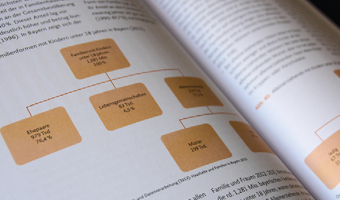Family Monitoring
Origin and objectives
Family reporting has a long tradition in Germany. As early as 1965, the German Bundestag commissioned the federal government to provide family reports. Regular family reporting serves to continuously monitor the situation of families, to create a data basis for political decisions and to review the effectiveness of family policy measures.
As family reporting regularly and systematically monitors data on the situation of families, it can be viewed as a special type of social reporting.
Family reporting for the state of Bavaria is one of the central tasks for the State Institute for Family Research at the University of Bamberg. The project “ifb-Familienreport Bayern” (ifb Family Report Bavaria) was initialized by the ifb in 1998 and set up as a permanent task in consultation with the former Bavarian State Ministry for Labour and Social Affairs, Family and Women. The project has been set up as a comprehensive reporting system with comprehensive reports every three years. Between these reports, important data are updated and presented in a collection of tables and corresponding graphs. The focus is on documenting the current social and economic situation of families in Bavaria against the background of long-term developments. Examples include the pluralization of family lifestyles, the rising age of women and men at the transition to parenthood, the declining number of people living in family households and the increasing number of mothers in employment.
Scientific Approach
The continuous ifb family reporting compiles general structural data on Bavarian families (topics: Families and lifestyles, marriages and divorces, births, family and employment) as well as on selected family policy measures of the Bavarian state government and presents them in long series and categories with relevance to family policy. Various publications of official statistics are screened and reviewed: statistical reports as well as the GENESIS online databases of the federal and state governments. In addition, the official 1 % sample of the resident population in Germany, the Microcensus, is evaluated. In addition, data on family policy services provided by the Bavarian State Ministry for Family Affairs, Labor and Social Affairs are presented in long series: both care infrastructure and expenditures for and utilization of family policy services. Since official statistics cannot fully capture the increasing diversity of family relations, ifb family reporting additionally relies on data sources that can map family relations within and between households, such as the Socio-Economic Panel (SOEP). Continuous family reporting provides mainly descriptive statistics, such as univariate distributions - in absolute numbers, proportions, or rates of change. For in-depth reports, further data sources are used and analyzed using adequate descriptive and inductive methods.
Publications
The continuous reporting is provided annually in the ‘ifb Familienreport Bayern – Tabellenband’ (collection of tables) as well as in graphics on the institute’s website under ‘Zahlen und Fakten’. In-depth reports that focus selected key topics are published at irregular intervals. The results of this extensive data compilation and analyses are available to decision-makers in politics, administration and associations, as well as to the scientific community and the general public. The family reports, Tables collections and graphics are provided on the ifb website.
Results of Basic Research in the research area of family monitoring are presented to the scientific community in the form of refereed journal articles.


